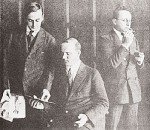Title
Subhead
Curling up with P. G. Wodehouse seems like the perfect antidote to a chilly winter night. Even better if the likes of Jerome Kern, George Gershwin and Cole Porter are in the mix. And they all will be on January 15, when the New York Festival of Song comes to Juilliard for its ninth consecutive season.
Body
This year’s NYFOS@Juilliard program is The Land Where the Good Songs Go, a celebration of Wodehouse’s long partnership as lyricist for Jerome Kern, with a nod to his briefer collaborations with Porter and Gershwin. The cast, culled from Juilliard’s voice department, includes sopranos Mary Feminear and Raquel Gonzáles, mezzo-soprano Hannah McDermott, tenors James Knight and Alexander McKissick, and baritones Joseph Eletto and Benjamin Lund.
Faculty member Steven Blier, the artistic director of NYFOS (Michael Barrett is the associate artistic director), gave The Journal a quick preview of what to expect—and a few lyrics to chuckle over in anticipation of the show.
This is a show I did in 2001-02, in London, New York, and Washington, D.C. I love the elegance of Kern’s music and the wit of Wodehouse’s lyrics—old-fashioned in style, yes, but eternal in their depiction of courtship. Just today one of the singers got done with one of her pieces and said, “Oh my, I totally get this—this is exactly like my life!”
I thought the students would enjoy the music-hall feel of the songs, the flavor of vaudeville, the open invitation to comic invention. Kern’s music lies well for classically trained voices, a bit higher and less belty than popular song would get in the 1930s and ’40s. And the way the material straddles America (Kern) and England (Wodehouse) is a continual source of allure. I am blessed with a beautiful cast of singers, most of whom are new to NYFOS.
I am collaborating on this project with three great artists. Faculty member Mary Birnbaum will direct the show; Greg Utzig will play guitar, mandolin, ukulele, and banjo (just as he did 12 years ago); and Hal Cazalet (’96, voice/opera), will do some additional staging and coaching at the end of our rehearsal period in January. He was my student here and sang the show the first time around. He’s also a great-grandson of P. G. Wodehouse, and embodies these songs in the most uncanny way. We’ll have just a few precious days with him in January, but I cannot wait to see Hal and work together again. With Mary, Greg, and Hal, we’ll have a booster shot of style and elegance.
And now, a preview of some of the lyrics, all of which are set to music by Jerome Kern.
A girl tells her new boyfriend that she was a loose woman—when she was 5:
I never missed chances
Of juvenile dances
For my life was one mad spree.
I was oft kissed ’neath the mistletoe
By small boys excited with tea.
If I’d known that you existed
I’d have scratched them and
resisted—dear—
But I never knew about you—
Oh the pain of it!—
And you never knew about me….
A man who has a job on a boat can only contact his girlfriend through Morse code:
You can’t make love by wireless
It’s like bread without the jam.
There is nothing girls desire less
Than a cold Marconigram.
For it’s something you can’t speak to
From a someone you can’t see.
It’s like a village church that’s spireless,
Or a little home that’s fireless,
Or a motor car that’s tyreless,
And it isn’t any good to me.
From the original 1917 version of “Bill,” which Wodehouse subsequently revised for Show Boat in 1927:
He’s just my Bill
He has no gifts at all:
A motor car
He cannot steer;
And it seems clear
Whenever he dances,
His partner takes chances.





